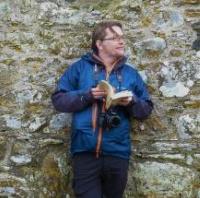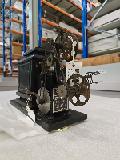Blog
Unless otherwise stated, content is shared under CC-BY-NC Licence
Version 1.2.0 of the Digital Preservation Publications Index is Live
Andy Jackson is Preservation Registries Technical Architect at the Digital Preservation Coalition (DPC)
Last year, the first output from the Registries of Good Practice Project was the first version of the Digital Preservation Publications Index, which focussed on bringing together the proceedings of the iPRES conference series from 2004-2023. Then, just before Christmas, the iPRES 2024 committee helped bring the index up to date (a.k.a. v.1.1.1).
Now, the latest version (v1.2.0) fixes some issues with the iPRES 2022 data, where some publications were missed and others could not be accessed any more. You can see the improved iPRES 2022 records here.
Fixing these problems was rather fiddly, and the resulting situation raises some questions about how we all might want to manage iPRES proceeding in the future. If you're interested in that, please read the more detailed analysis in Re-indexing iPRES 2022.
If you have any feedback or questions, feel free to email me, book a call with me, or talk to me at iPRES 2025.
Preserving the digital legacy of company archives: Last stop, Newhaven.
Ray Moore is an Archives and Records Officer with the City of Edinburgh Council and member of the DPC Advocacy and Community Engagement Sub-Committee.
Back in spring (2025) the City of Edinburgh Council made a successful application to the UK National Archives, through its Archives Revealed program to secure and catalogue the digital legacy of the Transport Initiatives Edinburgh Ltd, latterly known as TIE Ltd (TIE). Active between 2002 and 2011, TIE functioned as an arm’s length external organisation (ALEO) for the City of Edinburgh Council and was responsible for the development of the transport infrastructure within the Edinburgh and surrounding areas. The company gained some notoriety, both nationally and internationally, due to the handling of the Edinburgh Trams development, with claims of mismanagement, contractual disputes, litigation, delays, and financial overspend. Such was the extent of these concerns that the project became the subject of a non-statutory public inquiry in 2014 (this reported in 2023). The records associated with TIE therefore represent an important, if controversial, part of Edinburgh’s recent history, but also have considerable academic interest as important exemplar of ALEO’s and their role in how local government managed infrastructural development at the start of the century.
From Physical Archives to Digital Preservation: Reflecting on a Forty-Year Transformation
Holly Duncan is the account executive for Preferred Media and DPC Supporter
More than forty years ago, Preferred Media began as a physical archive, safeguarding film, tape, and disk media for clients across Australia. At the time, the role of an archive was straightforward: provide shelves, cataloguing, and climate control so materials could be stored and retrieved when needed.
Over the decades, preservation has changed. Today, it is not just about storage, but about ensuring media survives rapid technological shifts, remains accessible, and does so in a way that is sustainable.
Tune in to iPRES Radio – Your Daily Dose of Digital Preservation from iPRES 2025!
Sarah Middleton is Chief Community Officer for the Digital Preservation Coalition (DPC)
Whether you are attending iPRES 2025 virtually, or you are simply curious about the latest in digital preservation, iPRES Radio provides a front-row seat to the global conversation happening in Wellington this year.
Running daily from Monday 3rd to Friday 7th November 2025, alongside the iPRES 2025 Conference, iPRES Radio is a relaxed, one-hour online session hosted via Zoom, and it is open to everyone - no registration for the main conference is required. It is a chance to connect, reflect and engage with the iPRES community, wherever you are in the world.
Pre-Appraisal Guide for “the stuff”
Lisa Lawlis is an Assistant Archivist at Western Libraries and Rachel MacGregor is the Digital Preservation Officer at Modern Records Centre, University of Warwick.
One of the best parts of being DPC Members is connecting with other professionals who have similar digital preservation challenges. We met during the Reappraising Appraisal event (https://www.dpconline.org/events/eventdetail/360/-/-) in September 2024 and discussed how we both needed a resource for staff to triage born digital record donations.
Archiving Facebook, Right Now
Andy Jackson is Preservation Registries Technical Architect at the Digital Preservation Coalition (DPC)
Archiving social media is a long-standing concern for digital preservation, and a challenge that only seems to get more difficult as the years go by. Recently, we’ve had a couple of members raise questions in this area, and so I spent a little time looking at a specific example:
If you need to archive a Facebook account now, like, right now, what should you do?
Because as far as I can tell, it’s a bit of a nightmare.
A Snapshot of IIIF 2025: Key Takeaways from the Annual Conference
Sebastiaan Schoonebeek is Digital Collections Team Software Developer at University of York. He attended the IIIF Annual Conference with support from the DPC Career Development Fund, which is funded by DPC Supporters.
This year’s International Image Interoperability Framework (IIIF) Annual Conference at the University of Leeds brought together a vibrant community of researchers, developers, and digital preservation practitioners. Over three packed days, institutions from around the world shared their work with IIIF and related technologies.
Exploring Non-Traditional Imaging at IS&T Archiving 2025
Geoffrey Schilling is Digital Production Technician at University of Arizona Libraries. He recently attended the IS&T Archiving Conference with support from the DPC Career Development Fund, which is funded by DPC Supporters.
Through a grant provided by the Digital Preservation Coalition’s Career Development Fund, I was fortunate enough to be given the opportunity to attend the IS&T Archiving 2025 conference in Granada, Spain. This year’s conference location was just down the hill from the breathtaking Alhambra and Generalife at the University of Granada’s Escuela Técnica Superior de Arquitectura.
Digital Preservation at the National Museum of Australia: Introducing the Changeable and Digital Team
This blog post was co-authored by Andrew Martin, Digital Preservation Coordinator, Ashley Gregory, Digital Preservation Technician, Candice Cranmer, Senior Changeable Officer and Asti Sherring:, Changeable and Digital Manager at the National Museum of Australia.
This month marks the first-year anniversary for the Changeable and Digital team at the National Museum of Australia (NMA). The team are now embedded in the Collections Platform Business Unit within the Growth and Engagement Division. Digital collections specialists have been brought together to ensure the Museum’s collections are discoverable, managed and preserved, by leveraging innovative digital technologies and strategies to connect our diverse audiences.
Workflows At The University Of Sheffield: Showcasing The Work Of The Last Year
Bryony Hooper is the Digital Preservation Manager at the University of Sheffield
The University of Sheffield’s Digital Preservation Service and Special Collections, Heritage and Archives teams recently got the chance to showcase some of the hard work colleagues have undertaken over the last academic year. As part of a Library All-Staff in person event in June, projects from 2024/25 were given the chance to showcase their work for staff to view and engage with. And we are not ones to miss an opportunity to advocate for digital preservation!
The 2024/25 Library Action plan had an action to, “Develop our service vision, infrastructure and workflows to advance our digital Cultural Collections”. This action included work to develop our digital preservation workflows, in particular how we transfer data off physical media carriers (floppy discs, optical discs, Memory cards and external drives) to our digital preservation system.

























































































































































